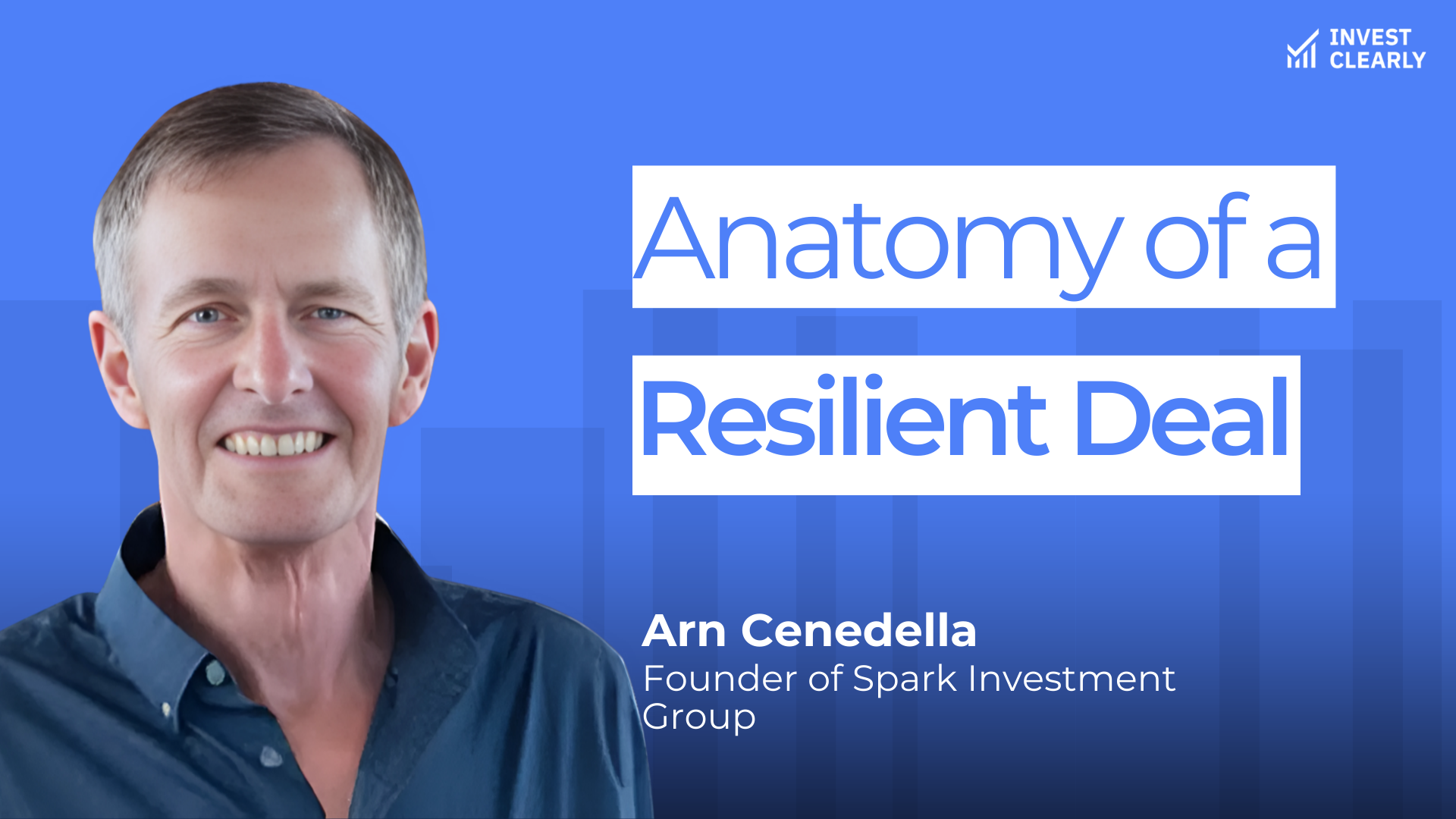
47 Years of Building Wealth Through Real Estate with Arn Cenedella
Never miss an Invest Clearly Insights article
Subscribe to our newsletter today
In this conversation, Arn Cenedella shares his extensive experience in real estate, transitioning from residential brokerage to multifamily syndication. He discusses the importance of building trust with limited partners, the operational challenges faced in the syndication landscape, and the significance of communication and transparency.
Arn emphasizes the need for long-term investment strategies and offers valuable advice for new syndicators and investors looking to navigate the complexities of the real estate market.
47 Years of Building Wealth Through Real Estate with Arn Cenedella
Introduction
[00:00:38] Host: Welcome back to the Invest Clearly Podcast. I'm your host and CEO of Invest Clearly, Pat Zal. In today's episode, we sit down with Arn, a tech founder and limited partner who spent the last decade navigating private markets and building Visor, a platform for managing complex portfolios.
We talk about risk-reward tradeoffs, sponsor underwriting, and why the structure of a deal should reflect the experience of the operator. Arn also shares what he's observing across thousands of portfolios that may be contrary to what you think, and what he believes needs to change in how GPs handle communication when things go wrong.
Let's get into it.
The Interview
[00:01:29] Joe Guidi: Arn, thanks for joining me.
[00:01:31] Arn Cenedella: Joe, thanks for inviting me. Looking forward to our chat.
[00:01:37] Joe Guidi: Yeah, me too. I'm really looking forward to it. I love the approach you guys are taking, especially from the education perspective. We'll get into that in a minute. But before we get started, would love for you to talk a little bit about who you are and what you do for listeners who may not be familiar with you.
[00:01:52] Arn Cenedella: I've been in the real estate business since 1978, so that's 47 years. I started as a residential broker in Palo Alto and Menlo Park, California—basically Silicon Valley. I did residential real estate there for 35 years and started to build a small rental portfolio because way back then you could actually buy stuff in the Bay Area that would work as rentals.
I had the good fortune to start investing in Austin, Texas after 2000, and I think most of your listeners know what's happened in Austin. About 10 years ago, Laura and I moved across the country to Greenville, South Carolina—kind of a lifestyle transition, a new adventure if you will.
[00:02:50] Arn Cenedella: Then about five years ago, I moved to multifamily. So I'm now a multifamily syndicator, operator, sponsor—whatever term you prefer to use. Our market is Greenville, South Carolina, and we just recently completed our eighth syndication acquisition.
[00:03:10] Joe Guidi: Awesome. So why the shift from residential brokerage to syndications?
[00:03:16] Arn Cenedella: I think I just wanted to learn something new. It's still residential—I'd been in residential real estate all my life. I didn't jump from single family to office or industrial. It's kind of a natural, logical step to multifamily residential.
Clearly there's an affordability issue in the United States. Apartments are one of the most affordable housing options for many people in America, so I think there's strong demand there. Frankly, there's a limited supply—there's an undersupply. So I think the dynamics, the economics of supply and demand, set up well for long-term investing in apartments.
[00:04:09] Arn Cenedella: The other thing I would say is single family investing is maybe more of a solitary experience. Of course, you might have a property manager and work with brokers and things like that. But with multifamily, it's more of a team effort. Frankly, I enjoy the partnership with my colleagues, working together. Multifamily allowed me to partner with some folks that had skills I didn't have and were better at certain aspects of the business than I was. That allowed me to focus on what I do best, which not coincidentally is what I enjoy best. Funny how that works, right? You're good at the things you enjoy doing. I really like the team aspect of it, and I think it's a good long-term economic investment.
[00:05:09] Arn Cenedella: The final point is we treat our residents as our most important customers, and we try to provide them a quality living experience in return for rent. They work hard and deserve a good place to live. When we acquire assets, we generally improve the communities and upgrade them. We want to provide nice, safe, affordable housing for people who need it. We're local, so as we turn these buildings over, there is some sense of helping our community and making community improvements. Those are some of the factors that led me to go to multifamily. I still have a few single family investments, but I've kind of gone all in on multifamily.
[00:06:02] Joe Guidi: Okay, cool. I love the community approach. You can totally see what you're saying about the team effort there. In the shift to syndications, obviously a lot of this podcast is about our audience—LPs. The whole site is geared around LPs and trust and transparency. The shift from single family investing to doing syndications and bringing in LPs—walk me through that. That must have been a new experience for you for the most part.
[00:06:30] Arn Cenedella: Oh, it was definitely a new experience. A local investor friend of mine, a young guy much younger than me here in Greenville, called me up in March of 2020. If you recollect, that's about the time we understood COVID was actually a huge deal. He asked me, "Hey Arn, what do you think is gonna happen with rent collection?"
I said, "Well, I don't know. I got my March rent—talk to me in April." But at the end of the phone call, he turned me on to a podcast about multifamily investing. That literally caused a light bulb to go off. I started consuming podcasts like yours, went to a few conferences, and actually had two different mentors.
[00:07:23] Arn Cenedella: Even though I had 40 years in the real estate business, I understood multifamily was something a little bit new. I entered two coaching programs that both provided me something different, and that's how I got involved in it.
I can tell you our first deal—we bought it in May of 2021. Not a huge deal. It was about $2.8 million, 43 units in Greenville, maybe 20 minutes from my house. We had to raise $1.5 million. My partner Brian and I didn't know we could raise $1.5 million. We thought we could, and we did. That kind of gave us our start.
[00:08:14] Arn Cenedella: Part of why I switched to it early 2020 but didn't acquire my first asset till early 2021 was taking the time to educate myself. But number two, I also recognized I wasn't the operator. I'm more the hunter, the deal finder, the networker. I knew my partner Brian, because I turned my rentals over to him. He's the property manager, asset manager.
Until I could take that step to buy my first deal and ask people to invest money with me, I had to know—I had to have confidence that I had the operational aspect nailed. Brian has 15 years of property management experience, and prior to that 15 years as a master plumber, so he knows his way around construction sites.
[00:09:11] Arn Cenedella: I think a recurring theme in the syndication market now is—I'm sure many of your listeners have heard of deals that haven't gone as well as they would've hoped. What that's bringing home is the real importance of being able to operate these assets professionally. That's been borne out, so I got Brian on board. We looked at four or five properties, finally found one we both liked, and we took the plunge. Now we've completed eight syndications, but that was our first.
[00:09:56] Joe Guidi: Yeah, I think you're totally right about that. I mean, we certainly hear stories of operations being the challenge, and I think that has come to light in the industry, especially as so many have gotten into it quickly and been a bit overpitched on acquisitions. That's a good point.
[00:10:19] Arn Cenedella: Yes. And there was a perfect storm in 2019-2020 and our reaction to COVID—the political decisions made to shut down the economy, which then led to decisions to bring interest rates basically to zero to keep the economy afloat. We kept saying these are historically low rates. People were getting mortgages under 3%, buying multifamily at 3.5%. They kept saying yes, historically low, but they seemed to have forgotten what does "historic" mean? It doesn't mean normal. It means unusual, right?
[00:11:41] Arn Cenedella: People got into the game maybe with limited real estate experience. The rapid decline in rates and cap rates created a situation where you could buy apartments profitably, even if you didn't have any idea what you were doing running these assets.
Now I think we've returned to a more normal market. When I bought my first house, I paid 11.75% interest rate, so 5.5% interest rates don't scare me. That feels more normal than 3% or 3.5%. Operations and a little bit more of a long-term perspective, as opposed to flipping buildings every two years—that isn't really real estate investing.
[00:12:10] Arn Cenedella: Investing is more long-term. Where the operations come in is if you can increase your rental income 2 or 3%, and reduce expenses 3 or 4% by working efficiently, knowing what you're doing, and moving quickly, that creates the margin for a profitable investment in a normal market where interest rates are basically flat.
It's been an interesting transition, and I know some LPs have gotten hurt. I feel badly about that. Again, it's a matter of educating people about real estate investing, not overselling it.
[00:13:15] Arn Cenedella: If I was an LP with a pretty nice, good-paying job at professional level status making good money, and my goal when I was 35 years old might be 10 or 15 years to get to the point where maybe I become work optional—I think a 10 or 15 year plan with systematic real estate investing can create that. Unfortunately, we had a lot of gurus trying to sell the idea you could do it in two years, and it's just not realistic. But long-term, steady investing, I think in 10-15 years, can create financial security and freedom.
[00:13:52] Joe Guidi: Get rich slowly, right? That's what they say.
[00:13:54] Arn Cenedella: Get rich slowly. And then the other thing is you don't have to be the smartest guy in the room if you just go into these deals properly. For me, what that means is relatively low leverage, fixed rate debt. Have ample cash reserves for when Murphy's Law hits, and have some operational ability.
At that point, if you have a seven to 10 year timeframe, you are almost certain to win. I would ask your listeners: does anybody in your audience believe the price of housing 10 years from now will be less than it is today? I would almost see that as an impossibility.
[00:14:51] Arn Cenedella: Again, if you set it up right and are able to ride out the downturns, you're gonna come out the other end and you're gonna win. Generally in my career, I've seen real estate go up 6, 7, 8 years in a row. There's a year or two of decline, a year or two flat, which then just sets the plateau for the next 10 year run up. If you just get through that one or two years of a little bit of turbulence, you're gonna be fine. That's kind of our approach at Spark.
[00:15:19] Joe Guidi: Well, I think we could go real long on that topic. So let's move on. You're coming out of single family, you're starting to do syndications, and you're bringing in this new constituency into your world, which is the LPs, right? You go out to raise—I think you said $1.2 million for the first deal—and now you've got this new group of people to interact with. You always had the tenants, you probably had some managers that worked with them and helped find them. What is your approach to LPs?
[00:15:59] Arn Cenedella: It's a great question. I came from a real estate background before I went into the multifamily space, so I had a pretty loyal client base back in the Bay Area. That was one group I reached out to about multifamily investing.
My partner Brian here in Greenville has Progressive Properties of Greenville with maybe 500 houses under management, so he has a client database that knows, likes, and trusts him. We tapped that. So those were two avenues that were kind of ready-made for us to work on.
[00:17:00] Arn Cenedella: The other part is we're very active, particularly me, on social media. I do a lot of Facebook posting, a lot of LinkedIn posting. A lot of it is educational content, and a lot of it's about Greenville. My brand has kind of become Greenville, South Carolina, so my name's been connected to that. As we're doing all this, I'm networking with local real estate people, and that's kind of how we did it.
The other thing is I built my residential brokerage business largely on referrals, and that's a similar process happening here. We attracted that initial group of investors—I think it may have been about 30. We did a great job for them. Six months later when we had another deal, they invested and maybe they brought one or two of their friends along. So we're building the network that way.
[00:17:54] Arn Cenedella: Social media is a big part of it. I've actually acquired property as large as $38 million basically on my social media content and regularly posting. We have a monthly newsletter that goes out to all of our investors. In addition, we send a monthly newsletter on each property to that specific investor group.
We're a relatively small group. I think now we have maybe $13-14 million of capital invested, and all of our investors have access to the three principals—Arn, Dan, and Brian. I think that helps because the investors can reach out and actually talk to somebody who's intimately connected with the deal.
[00:18:50] Joe Guidi: Yeah, definitely. I mean, I think access is really important, especially in the early days. So are most of your LPs first-time investors in syndications, or do they have experience?
[00:19:02] Arn Cenedella: I would say a large percentage of them are first-time. We always do, at least to date, 506(b) deals, which for your audience I'm sure they know, but to fill them in—it's open to accredited investors but also so-called sophisticated investors who are not accredited but have the financial knowledge and income stability to properly evaluate the suitability of any investment for them.
So we do 506(b). The other thing we do—our minimum is $25,000. Our deals are relatively smaller. Average acquisition is maybe $5 million, so our raises are typically $2-2.5 million. So the 506(b) model really works well for us, and the $25,000 entry point really allows those first-time investors to get in.
[00:20:09] Arn Cenedella: Let's be frank—it's a little scary writing somebody a check for $25-50,000. Basically, as a limited partner investor, you're turning it over to the general partner. The general partner's in control. So I think to the degree you can minimize the barriers to entry and give people an opportunity to test it and see if they like it—
One thing I always talk to people about on my LP calls is: look, you don't have to go all in on your first investment. If you have $100,000-150,000 to invest, maybe split it up into 2, 3, 4 deals and then see who does what they said they're going to do and who doesn't. Who communicates with you? Who's accessible? Whose property is performing at projections? Who's meeting the promises they made when they sold the investment to you?
[00:21:36] Arn Cenedella: I like people being able to test the waters, find operators they like, and go from there. So don't go all in your first time. Do it in little bites. Make sure it's right for you, and if you like it and you find people you love to work with, then you can invest in their subsequent deals.
[00:21:38] Joe Guidi: Yeah, that makes a ton of sense.
[00:22:17] Joe Guidi: It sounds like your initial group of investors mostly came from your network, right? They know you, they trust you already. Same with your partners. And then you've got a significant number of referrals coming through because you're performing, your LPs like you, and that trust kind of transfers. I mean, that's what we find. In the early days, that's I think how all syndicators start. But you also have a huge social media presence. You're out doing a lot of education. Are LPs coming to you organically as well—people that don't know anyone you know and haven't invested with you?
[00:22:51] Arn Cenedella: Yes. I get people off social media. People in our database share our newsletter with their friends and colleagues, so we kind of do it that way. And see, to me, when somebody refers one of their friends or associates to me, they're putting their name to Arn. They're going, "Hey Joe, Arn's a good guy." So they're putting their name to you, and for me, that even adds an extra level of responsibility because not only do I gotta perform for the investor, but I gotta perform for Joe who referred Rick to me or Sally to me.
[00:23:52] Arn Cenedella: The other thing is there is that built-in element of trust. So when I'm talking to a new LP investor, if they already know a friend who's been happy with what I've done, they're gonna be open and receptive to what I say. Obviously they're gonna use their own judgment—does what I'm saying make sense? Does the style of investing I do make sense to them? But it's an easier process to build that connection, and we really like doing it that way.
We now have maybe 220 unique investors, and Spark is maybe in a little different spot. I'm 70, I'll be 71 here. I do this because I love it and I believe in real estate, and I want to help other people benefit from real estate.
[00:24:41] Arn Cenedella: My two partners are in their fifties, very successful investors in their own right. But we don't have any desire to build Spark into some huge syndication company. If we do two or three deals a year and they're quality deals, we're happy with that. We don't need this huge AI-driven funnel per se, because we have 220 investors and we've never not funded a deal. We've always completed every raise.
For us, it's harder to find deals that make sense than to find investors to fund them. Some people may have the opposite problem where they're always finding deals, which of course might lead to the question: How are they finding so many great deals when other operators can't?
[00:25:38] Arn Cenedella: When I see somebody come out with a deal every other month—I look every day. I can't find them. They're not that many out there. They're hard to find. So you gotta be a little selective.
[00:25:56] Joe Guidi: Yeah. I definitely think that's a great place to be—more access to capital than deals to fund it. I mean, obviously, ideally you gotta get those lines pretty close together. But I wanted to ask you about the trust piece because I think it would just be useful for everybody to hear. Many people are finding sponsors for the first time. Maybe they're finding them on Clearly. Maybe they're clicking on an ad. Maybe they're just Googling.
I'd love to hear from you—obviously you've got a really great network and it sounds like an LP base that really likes working with you. But given that you're out there educating people and occasionally you're talking to folks that don't know you, I would love to hear your perspective on how, when that trust transfer isn't already in place and the referral isn't in place, what does the process of establishing a relationship and building trust with an LP look like in that environment?
[00:26:53] Arn Cenedella: Yeah, and I guess maybe another way to phrase your question would be: how does an LP learn how to evaluate sponsors and deals? Would that be kind of a paraphrase? I think that's kind of what you're asking.
[00:27:11] Joe Guidi: Yeah, let's keep it at sponsors for now.
[00:27:13] Arn Cenedella: Okay. For sponsors, perfect. So a couple things for me. I believe to be a successful investor as a sponsor, I have to have a fairly narrow niche I'm very good at. I'd rather be deep than broad and shallow.
Let me phrase it this way: the right sponsor for a luxury apartment in Dallas-Fort Worth might not be the right sponsor for a heavy lift value-add in Charlotte, North Carolina. They're both great markets, so I think as an LP I would look for sponsors that really have a niche, a sizable footprint in a particular market with a particular type of property.
[00:28:16] Arn Cenedella: Because if they own three or four assets in a market and they're all, let's call them 1980s vintage, and they're presenting a new deal that's in that market that's a 1980s vintage, you can have a pretty good idea they know what they're doing with those 1980s vintage.
I would be hesitant to invest in a sponsor that has a deal in Boise, Idaho, then Phoenix, Arizona, and then Tampa, Florida. I don't believe you have the expertise to do that. So look for sponsors that have kind of a narrowly defined game plan that they've perfected and rinse and repeat.
I think that then leads to some level of experience in real estate investing and also somebody who's been through a few economic cycles.
[00:29:26] Arn Cenedella: What happened in the syndication space—it became widely available in 2012. Basically for 10 years we had a bull market in real estate. A lot of operators jumped in 2018-2019, never experiencing a down market. And now the last year or two we've had a down market, and we've seen there are some issues with that.
So I think look for operators with some historical track record through a variety of markets, because they've been there, done that. They understand how to better weather those storms that ultimately are gonna come.
Then I think the thing is rely on your gut instinct in evaluating people. When you're talking to somebody, do you feel you're being sold? Do you feel you're being read a script, or do you feel you're having kind of an authentic conversation with somebody? You just have to rely on your life experience.
[00:30:49] Arn Cenedella: Those would be some of my ideas. But find great operators that have a specialized game plan and they just do it repeatedly.
[00:30:49] Joe Guidi: Yeah. Yeah, that gets to the deal because obviously some of those specialized game plans are also what are going wrong right now in some cases.
[00:31:02] Arn Cenedella: Yeah. And so what I would say with deals that have gone wrong—I would say there've been some common characteristics. Almost invariably, they've been floating rate bridge debt, high leverage debt. We do low leverage, fixed rate debt. It's a lot safer, it's a lot simpler.
The other factor would be often they were very heavy lift value-add deals in very rough neighborhoods. And then the third factor would be often the ownership group, the general partner group, was not local. I think that makes a real difference.
[00:32:13] Arn Cenedella: When you look at deals that have gone bad—bridge debt, floating rate bridge debt, heavy value-add, absentee ownership—I'd say two out of those three will be involved in every deal. People who bought property with 30-35% down and got fixed rate debt—it may not be knocking it out of the park, but you're not in trouble. You're still getting distributions. There's no capital calls. You're doing fine. So there are some characteristics to the deals that went wrong.
[00:32:34] Joe Guidi: Yeah, that makes sense. And I think our listeners are probably seeing some of that in headlines or hopefully not in their own portfolios, but likely there as well. So let's go back to the trust piece in communication, because I think this is really important. You guys are still fairly—I mean, you've been syndicating for five years, so still fairly early. And given your strategy, I imagine you haven't had to do this, but given markets, things have changed in the past five years, so things don't always go 100% as planned. What does transparency in practice look like when things aren't going as planned?
[00:33:14] Arn Cenedella: Yeah. So I think, for me as an LP—and I'm an LP in about 10 deals—I want to know what's going on with my property, good or bad. So I think when an issue pops up, that should be communicated to the LPs immediately, along with what steps are being taken to rectify the matter.
I can tell you about three years ago during a heavy storm, we had a tree go down through one of our buildings that knocked out four units. Within 48 hours, our investors received an email from us saying: tree down, damage, we've secured the property, we're talking to insurance, etc. So right out of the gate, they knew there was an issue and they knew we were on top of it.
[00:34:29] Arn Cenedella: Hurricane Helene hit Greenville. Not as bad as it did Asheville, but it did hit Greenville. Again, on our seven or eight assets, we maybe had 100 trees down. Knock on wood, none hit any buildings, but we had 100 huge trees down. Again, within 48 hours of Helene, we were able to communicate to all our investors over the country who are just seeing stuff on the news—they have no idea what's going on, they're worried. We were able to say, "Hey, Brian and I have driven every asset. We're happy to report no damaged buildings, all residents in place. Yes, we've got a tree cleanup, but by and large we were very fortunate." So I think if there is bad news, put it on the table. Let them know what you're gonna do to rectify it, and that builds a lot of trust.
[00:35:19] Arn Cenedella: We acquired an asset in November 2024, a 1970s build, really heavy lift value-add. We're just putting in a new parking lot and driveway—$70,000 job, 38 units. The asphalt company shows up on Monday. They start scraping out the driveway and lo and behold, underneath the asphalt there are two huge tree stumps, which we didn't know were there, that then had to be removed, which of course was an additional cost. So next week we'll send out an update and let them know. Yeah, the driveway's underway, it's actually being finished today, but we encountered this problem and there is an additional cost.
[00:36:09] Joe Guidi: Got it. Yeah. Well, I think one of the things you just said there is something we're seeing a lot of reviews about, and that's your personal involvement. You got out and drove the properties and you sent an email, and I think that's something we're seeing a lot of chatter about—where is the operator? Is the GP involved? That seems to be really, really important to people right now. So I think that in and of itself is trust-building.
All right. I know we're going a little long here. I just want to see if I have any other questions.
[00:36:46] Arn Cenedella: I can talk real estate all day.
[00:36:48] Joe Guidi: Well, me too. I just want to make sure the listeners get as much as they can. For folks that are just getting started on the syndication side, since you've just done it, what advice would you give them about building trust early?
[00:37:16] Arn Cenedella: You mean building trust? How would GPs build trust?
[00:37:19] Joe Guidi: Yeah, GPs.
[00:37:20] Arn Cenedella: Yes. So there's an old expression: if it sounds too good to be true, it probably is. So I think as a potential LP, if I'm seeing returns promised—I've looked at 10 deals and this one deal has returns that are significantly better than another—I would wonder what's going on. That makes no sense to me.
The other thing would be we never pressure LPs to make a decision. So I would say if as an LP you feel you're being pressured to make a decision and invest, that would be antitrust-building. I think more to build trust, you present the opportunity, you give the investor space to analyze it on their own and sort through it, and then be available for a follow-up conversation. Because the greatest deal in the world will happen again next month, I promise you.
[00:38:50] Arn Cenedella: If you feel that pressure, that might be a little bit of a red flag to me. Whereas more like: this is an opportunity. If it feels right to you, we'd love to have you on board. And again, invest the minimum. Let us earn your business in the future by doing well. And so that's the approach we try to take.
[00:38:59] Joe Guidi: Yeah, that checks, right? You're partnering with them. That's it. It's the name, right? General partner, limited partner. So if you were to think about the passive investing space—I love this question—what element of passive investing needs to die, needs to go away?
[00:39:23] Arn Cenedella: Yeah. So I think one: if you're going to be a general partner, learn on your own dime first. What I mean by that is become a successful investor with your own money. With that experience and knowledge, now you put yourself in a position where you're qualified to handle other people's money.
I think what's happened in the passive investing space is people have jumped in without the necessary knowledge and experience of how to actually operate rental real estate. I wish the business would focus less on marketing and more on learning to do your job and providing some value to people.
[00:40:43] Arn Cenedella: The industry is going through a shakeout now because really, in order to succeed in a normal market, you actually do have to have some operational experience and knowledge. You just can't rely on declining cap rates and historically low interest rates. So that's kind of what I'd like to see changed.
And then the other thing would be: let's stop selling the two to three year dream. I've been in real estate 40 years. It's created a great life for me, but it didn't happen in five years. It may not even have happened in 10, but I would say 10 to 15 years is a more realistic timeframe.
[00:41:30] Arn Cenedella: I think if as a limited partner investor you start taking that approach, then you understand these line drive base-hit deals—not these home runs, not the grand slams—just these line drive base-hit deals over time will win the game for you. I'd like to see the investing morph more into what traditional long-term real estate investing has been. Flipping apartments every two years is not normal. We gotta get out of that mindset and return to more long-term investing.
I leave the listeners with this thought: Who are the wealthiest people in America? Who are the most successful real estate investors in America? They are people who have bought real estate for years and just keep acquiring real estate. They're not traders. They're investors with a long-term outlook. I think if we emulate that approach, we have a higher chance of success.
[00:42:29] Joe Guidi: It's a great thought to leave everyone with. In addition to that, let's leave them with where to connect with you directly. So if they want to learn more about Spark and you, where should they go?
[00:42:39] Arn Cenedella: Yeah, appreciate that, Joe. So the website is investwithspark.com, and I'm very active on Facebook and LinkedIn under my name, Arn Cenedella, or Spark Investment Group. So reach out anywhere and I'm happy to talk.
[00:43:00] Joe Guidi: Awesome. Thanks, Arn.
[00:43:01] Arn Cenedella: Thanks, Joe.
Written by
Invest Clearly empowers you to make informed decisions by hosting unbiased reviews of passive investment sponsors from verified experienced investors.
Other Articles
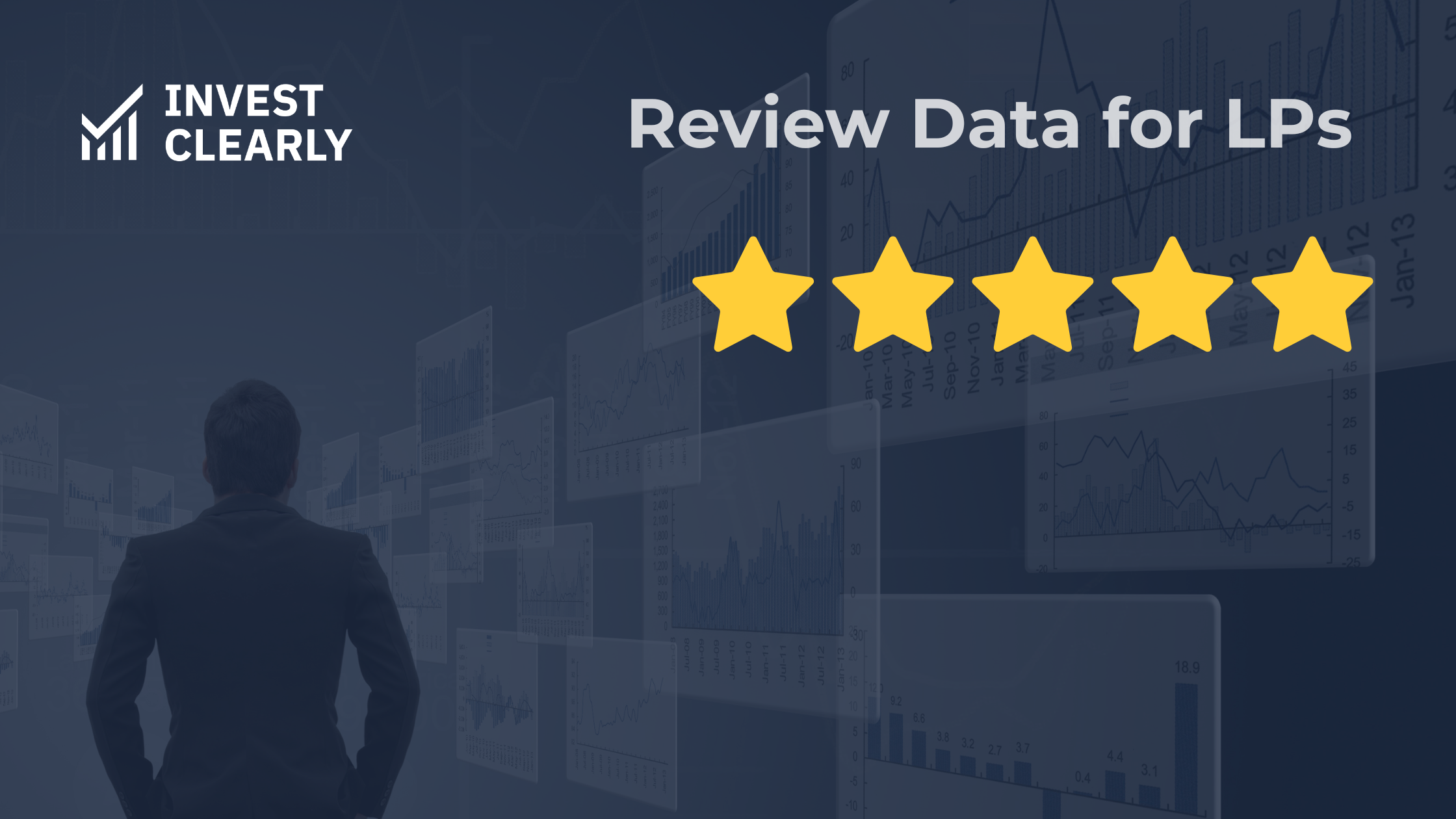
Investor Experience Index Q3, 2025: LP Takeaways
Discover quarterly insights of how LPs rate their experiences with GPs. Get data-driven questions to use when evaluating GPs.
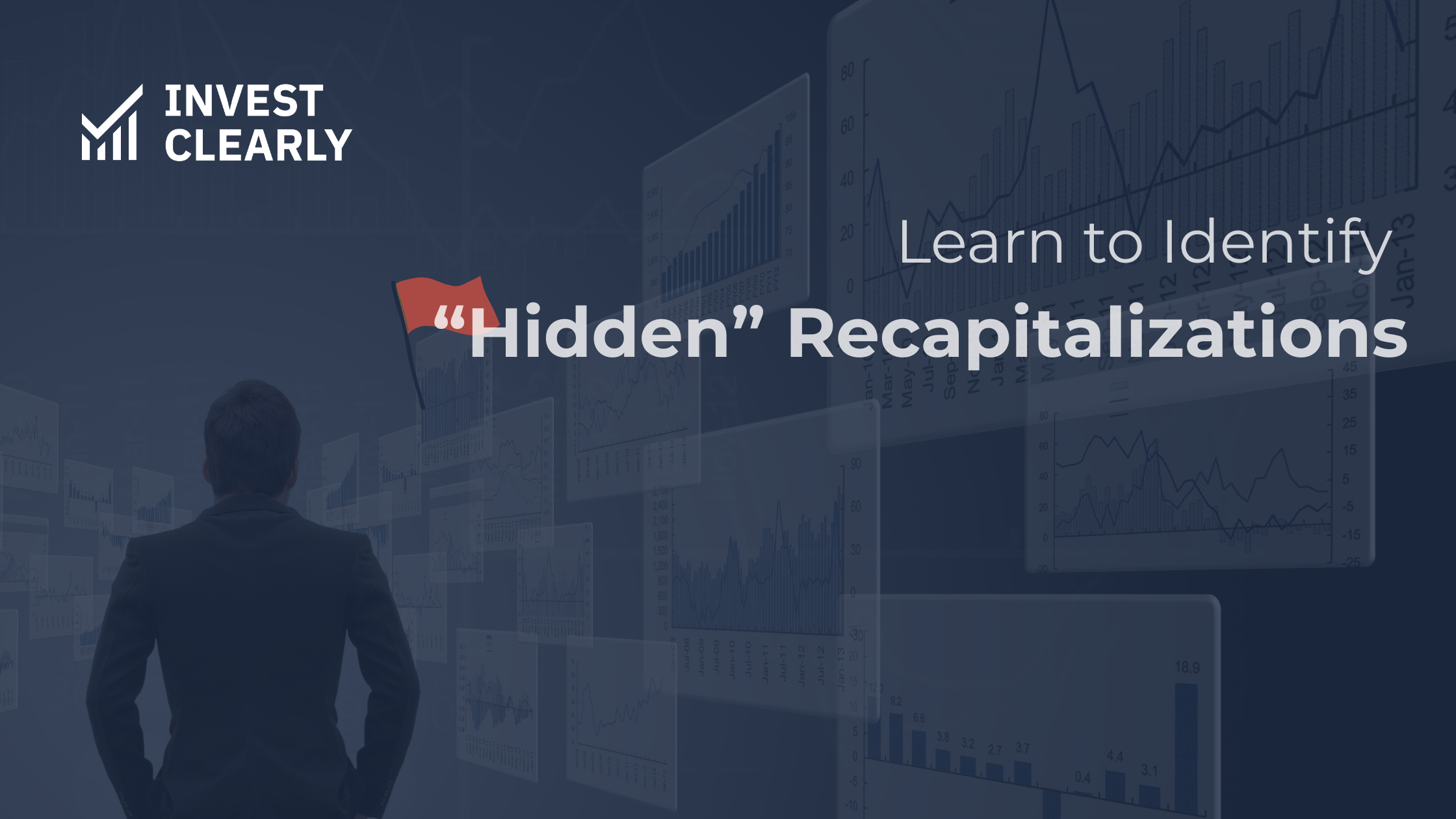
Real Estate Recapitalizations—What Passive Investors Need to Know
A recapitalization is a restructuring of a property's capital stack (the mix of debt and equity that finances an investment). While they can be legitimate business strategies, transparency can be an issue.
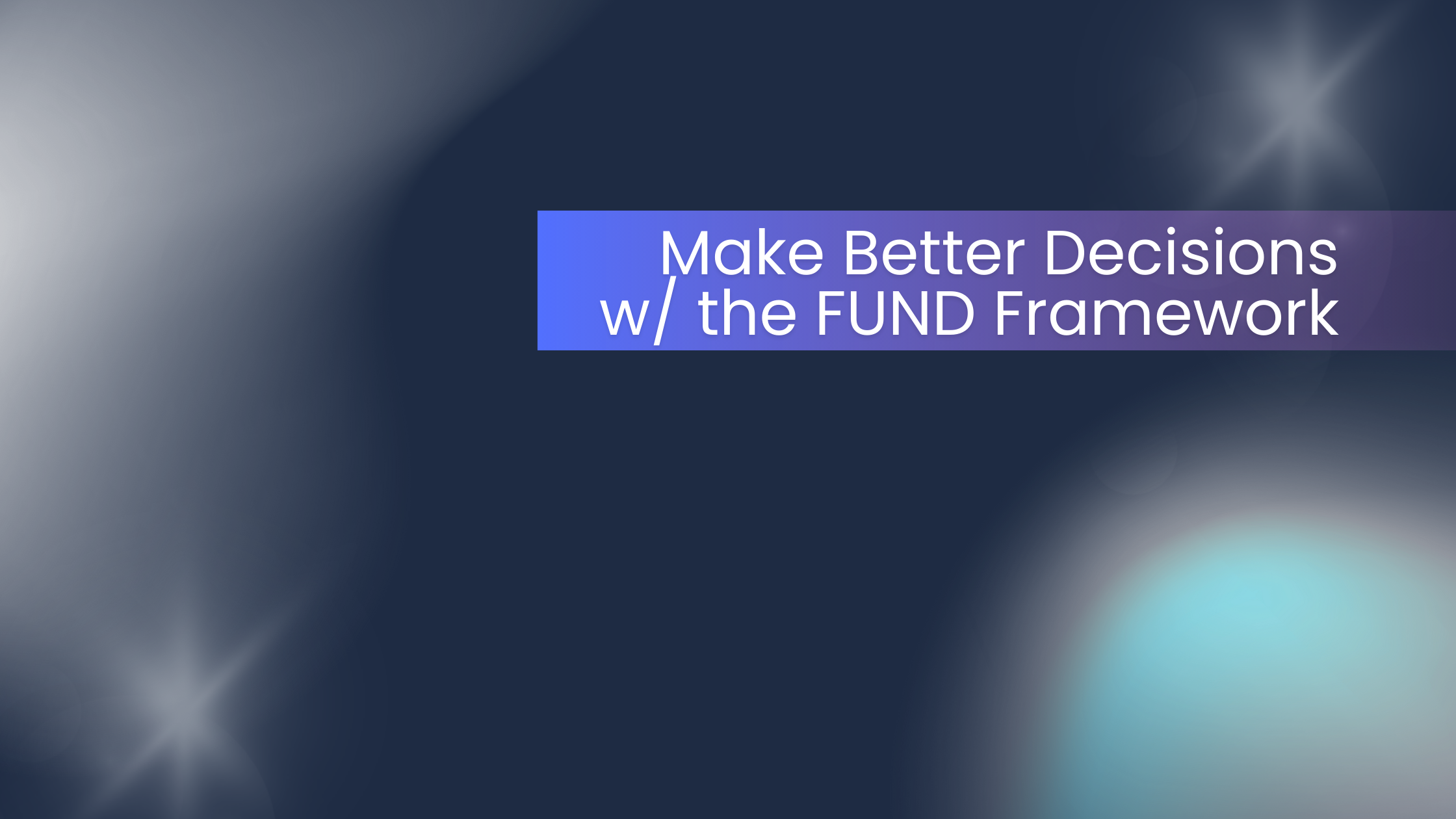
How to Evaluate a Potential Investment Using the FUND Framework
The FUND framework is a simple way to evaluate opportunities by looking at four pillars: Financials, Underlying Assets, Notable Differentiator, and Delegation of Responsibilities.
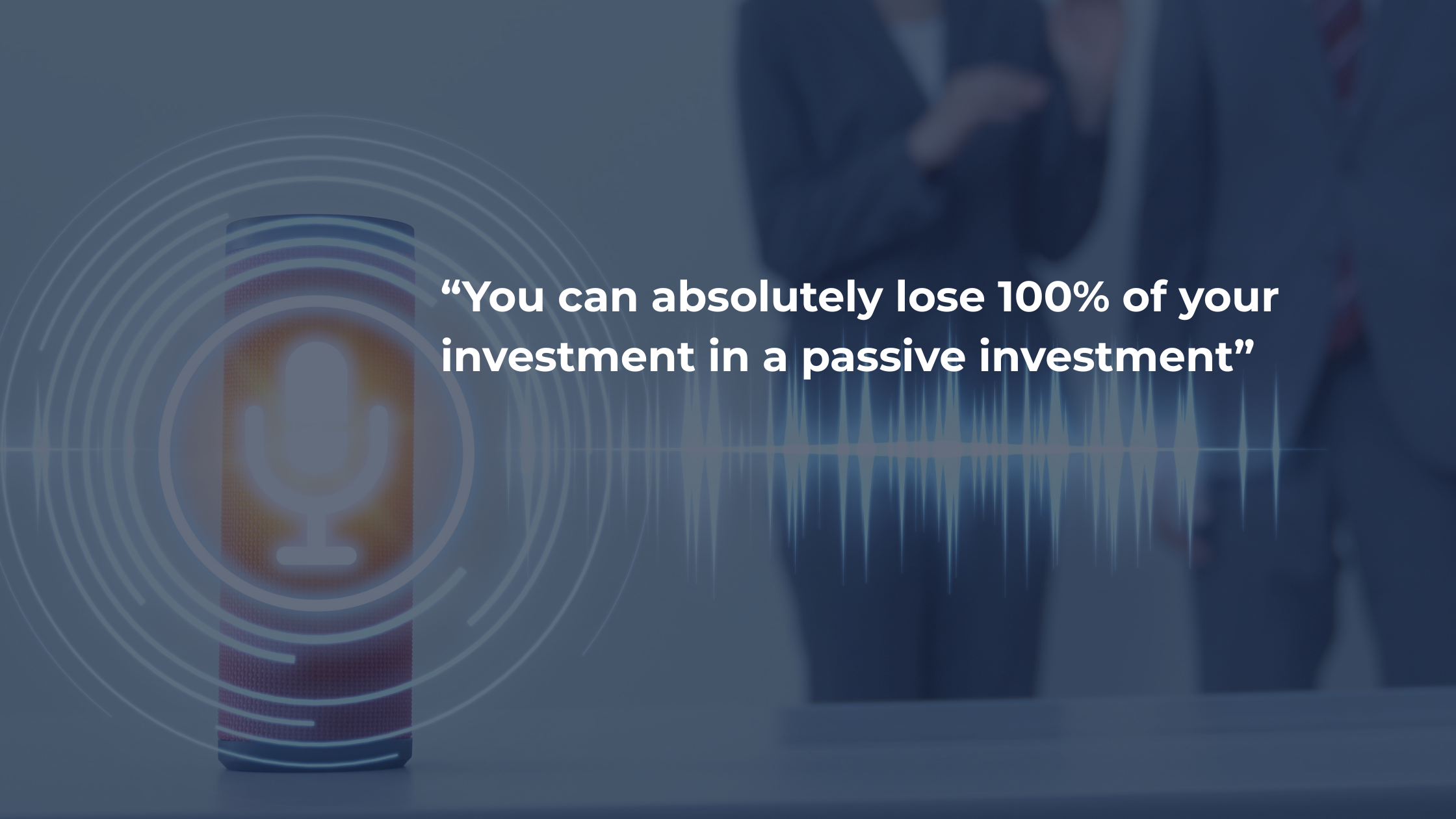
What Needs to “Die” in Passive Investing – According to Guests of The Invest Clearly Podcast
Get the answer to the closeout questions of each podcast episode: “What do you think needs to die in passive investing?” The answers are wide-ranging, from misconceptions about risk, to misleading marketing tactics, to structural issues in how deals are presented.

Passive Real Estate Investing Advice from Experienced LP Investors
Experienced LPs shared their most valuable lessons, drawn from years of investing across various asset classes and sponsor relationships.
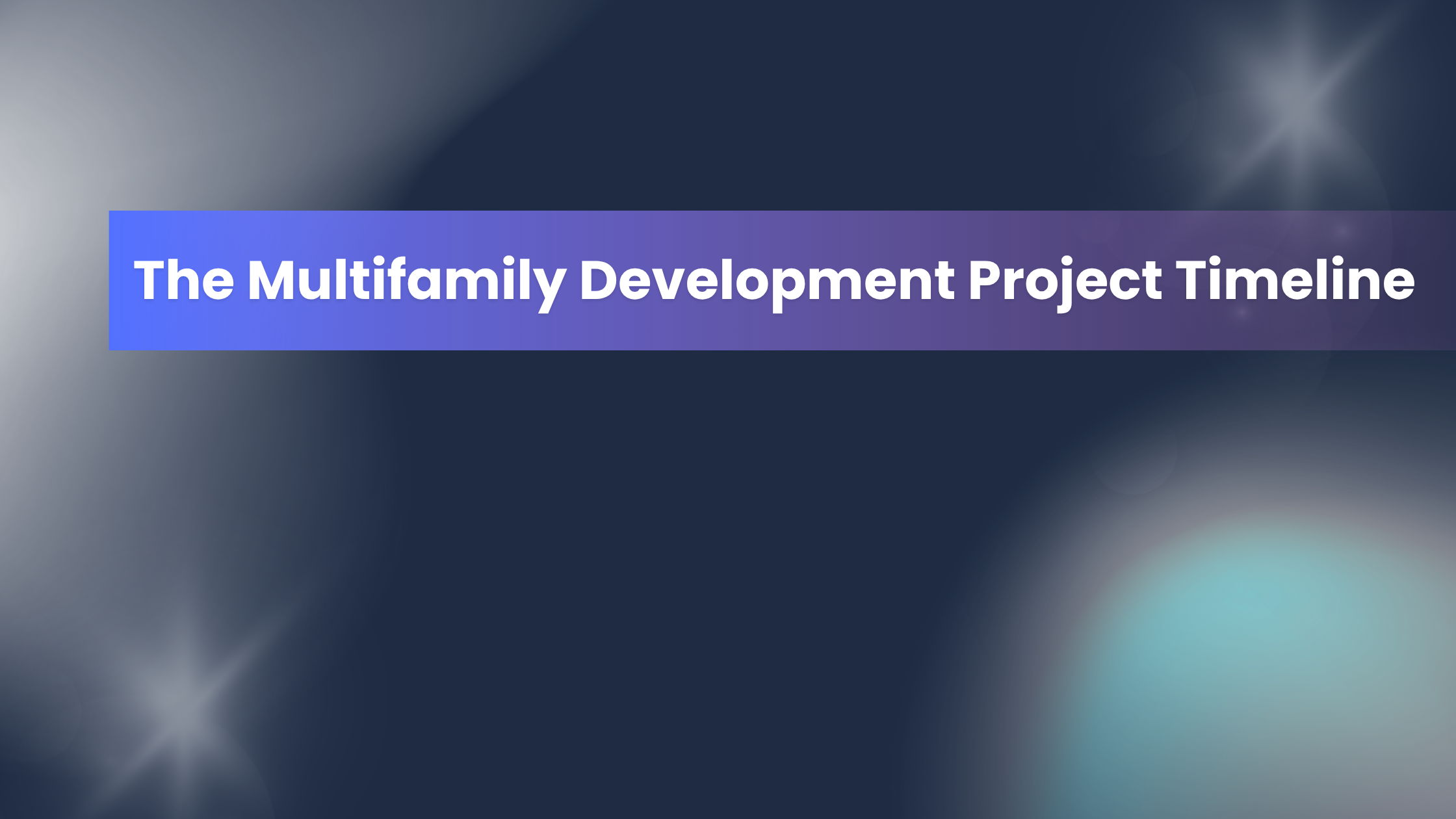
From Land to Lease-Up: The Lifecycle of a Multifamily Development Deal for LPs
This guide walks you through the typical timeline of a multifamily development project from the LP perspective. Learn when investors come on board, what happens during construction and lease-up, and how profits are realized at exit.